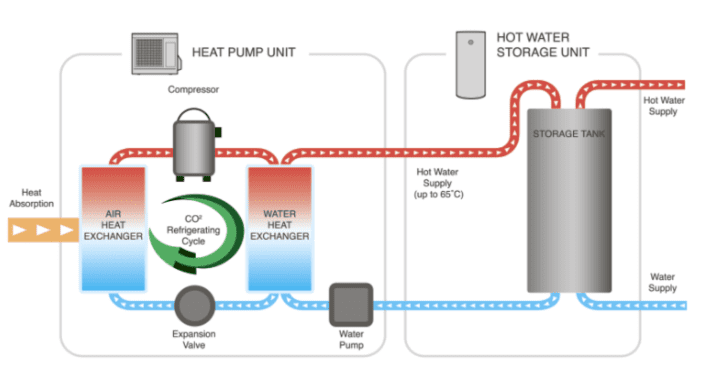Experiencing cold showers or waiting for hot water can be a major inconvenience, especially in winter. What’s worse is receiving a high energy bill at the end of the month.
Fortunately, the increasing popularity of renewable energy solutions like heat pumps and solar hot water offers potential relief.
But how do you decide?
This blog compares heat pump hot water systems and solar hot water systems- how they work, their effectiveness, cost and suitability for Melbourne.
Heat Pump Hot Water and Solar Hot Water- Understanding the Systems
Heat Pump Hot Water Systems

Heat pumps work by extracting heat from the ambient air and using it to heat water. This process involves a heat exchanger, a refrigerant cycle, and a storage tank. They are versatile and efficient across various climates. Heat pumps can use 60 to 75% less electricity compared to traditional electric hot water systems.
Solar Hot Water Systems

Solar hot water systems use solar collectors to absorb sunlight, which heats the water stored in an insulated tank. There are two main types of solar collectors: flat plate and evacuated tube.
While highly efficient in sunny conditions, these systems may require electric boosters during cloudy or rainy periods. Solar hot water systems are best suited for regions with consistent sunlight.
Cost Comparison
Upfront Costs
Heat pump systems generally have a higher initial installation cost compared to solar hot water systems. However, both systems are eligible for government rebates and incentives under programs like the Victorian Energy Upgrades (VEU) program, which helps offset these costs.
Operational Costs
Heat pump systems tend to have lower monthly energy bills due to their efficient use of ambient air. In contrast, solar hot water systems can benefit from free solar energy but may incur additional costs if electric boosters are frequently needed.
The payback period for solar systems is typically shorter (3-5 years) compared to heat pumps (7-10 years).
Energy Efficiency and Environmental Impact
Efficiency of Heat Pumps
Heat pumps offer consistent efficiency regardless of weather conditions, making them reliable year-round. They are particularly effective in Melbourne’s moderate climate, where sunlight is not always guaranteed. Heat pumps can provide significant energy savings, reducing greenhouse gas emissions substantially.
Efficiency of Solar Systems
Solar hot water systems are highly efficient in optimal conditions with abundant sunlight. However, their efficiency can drop during periods of low sunlight, necessitating the use of electric boosters. This variability can impact overall energy savings and environmental benefits.
Maintenance and Lifespan
Maintenance Requirements
Heat pumps require regular maintenance due to their mechanical components, which can include servicing every 3-5 years. Solar systems, with fewer moving parts, typically have lower maintenance needs, though newer technologies might present unique challenges.
Lifespan
Heat pumps generally have a lifespan of 10-15 years, while solar hot water systems can last up to 20 years. However, the longevity of solar systems is primarily due to the durability of the solar collectors rather than the entire system.
Climate Suitability- Heat pumps vs Solar for Melbourne

Heat Pumps in Melbourne
Melbourne’s climate, characterised by cooler winters and variable sunlight, makes heat pumps an ideal choice. These systems do not rely on solar energy, ensuring a consistent hot water supply throughout the year. Heat pumps are efficient and reliable in less sunny climates like Melbourne.
Solar Systems in Melbourne
Solar hot water systems face challenges in Melbourne due to inconsistent sunlight. Electric boosters may be needed more frequently, which can affect efficiency and cost savings. Despite this, solar systems can still be a viable option with proper planning and installation.
Practical Considerations for Melbourne Residents
Comparison Chart: Heat Pump Hot Water vs. Solar Hot Water Systems
Feature | Heat Pump Hot Water Systems | Solar Hot Water Systems |
Energy Source | Ambient air | Sunlight |
Climate Suitability | Suitable for varied climates, including less sunny areas | Best for sunny regions with consistent sunlight |
Upfront Cost | Higher initial cost | Lower initial cost |
Operational Cost | Lower monthly energy bills | Free energy from the sun but may need boosters |
Efficiency | Consistent efficiency | High efficiency in optimal conditions |
Maintenance | Requires regular maintenance | Low maintenance due to fewer mechanical parts |
Lifespan | 10-15 years | Up to 20 years |
Installation Complexity | Moderate, easier to position | Higher, optimal placement of collectors needed |
Space Requirements | Compact, can be installed in various locations | Requires roof space for collectors |
Environmental Impact | Low carbon emissions, uses renewable energy | Zero emissions, highly sustainable |
Government Rebates | Eligible in some states | Eligible in some states |
Payback Period | 7-10 years | 3-5 years |
Other considerations
Space and Installation
Heat pumps require less space and are easier to install in various locations compared to solar systems, which need roof space for solar collectors. This makes heat pumps more adaptable to different household settings.
Energy Source Versatility
Heat pumps can be powered by solar PV panels for additional savings, providing a hybrid solution that combines the benefits of both technologies. Solar systems, on the other hand, rely solely on sunlight, which can be a limiting factor in less sunny climates.
Conclusion
While both heat pump and solar hot water systems offer significant benefits over traditional systems, heat pump hot water systems are particularly advantageous for Melbourne residents.
Their consistent efficiency, lower maintenance needs, and adaptability to Melbourne’s climate make them a superior choice.
For more information, explore Gas Chill’s heat pump hot water installation options and ensure you have hot water all year round.


